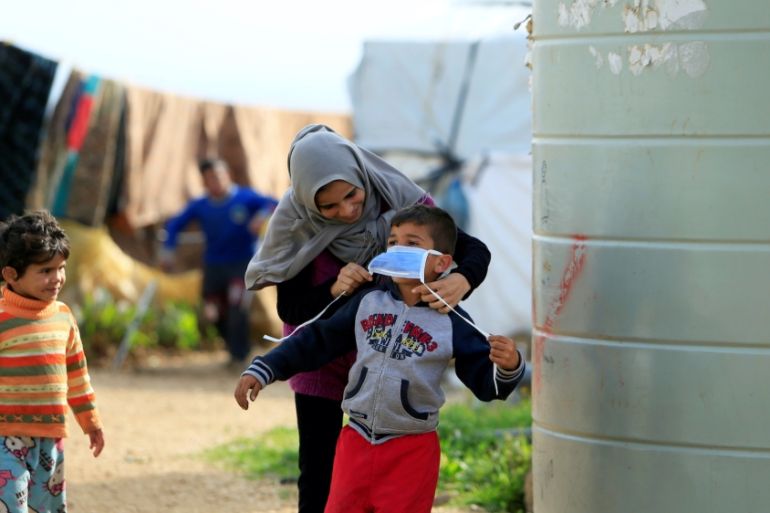We must keep our humanity in the time of coronavirus
We can ‘fight the monster without becoming one’ and achieve a finer balance of freedom and security for all.

The coronavirus pandemic, which has cost more than 75,000 lives with more than 1.3 million cases so far, has added a new dimension of uncertainty and anxiety to our already fragile and insecure world.
While many agree that nothing will ever be the same again, it is not clear what kind of global political order will emerge in the post-corona world.
Keep reading
list of 4 itemsWoman, seeking loan, wheels corpse into Brazilian bank
UK set to ban tobacco sales for a ‘smoke-free’ generation. Will it work?
Poland lawmakers take steps towards liberalising abortion laws
This ordeal has the potential to bring us closer to one another or turn us into further strangers in an increasingly estranged world. The choices we will make now will shape not just the geopolitical system and the economy, but also the state of our humanity in the decades to come.
The state of chaos, panic and the human cost caused by the coronavirus has exposed the weak faultlines of existing regional and international institutions. The United Nations has called it the “most challenging crisis we have faced” since World War II.
International organisations such as the UN, the European Union, the G-20 policy forum of 20 leading economies and the Organisation of Islamic Cooperation have largely failed to respond to the pandemic in credible and effective ways.
They already suffer from a crisis of legitimacy, but may have a chance now to recreate themselves. COVID-19 is killing people but also destroying the trust in the current world order and its institutions.
The age-old question of balancing freedom and security remains central with new dynamics. Many are already asking to what extent we are prepared to give up our freedoms for our security.
It is likely that authoritarian political orders and petty nationalism-cum-populism will gain further currency in the post-corona world.
The rise of security-based political orders seems inevitable in the short run but does not have to decide our future. Whether it is the oppressive nature of capitalist modes of production and multinational corporations or the old-fashioned nation-state structures, we must be vigilant against abuses of power.
As an all-embracing concept, human security cannot be separated from human freedom. A healthy sociopolitical order cannot function on the basis of security alone. Freedom is a sine qua non of human creativity, thinking, relations and production.
Balancing freedom and security is also essential for an effective fight against natural and human-made disasters.
There is no doubt that biosecurity and cybersecurity together with food security will gain further urgency, but this cannot be seen only as a matter of injecting more social engineering into the global community.
The key is to provide human security for all.
Global threats show that none of us is safe until all of us are safe. There are no longer cultural hierarchies, economic immunities or economic privileges for any region, nation or country. No country can win this fight on its own. Multilateral action and solidarity may sound like a cliche, but it is more urgent than ever to save lives.
The UN must restructure itself to cope with such pandemics. Giving advice is not enough. The World Health Organization must be empowered to take preventive action. The G-20 countries must take the lead in reserving funds for vaccine development and share the results with developing countries.
Whether in Wuhan, New York, Madrid or inside the refugee camps, protecting the most vulnerable must be the priority. We must remember and cherish our deeper humanity when we care for the elderly, the sick, the needy and the foreigner.
This is what is happening in countless hospitals, clinics and intensive care units around the world, where the true heroes of this ordeal – the doctors, nurses and health workers – are risking their lives to save others.
This deeper humanity must spread to every street, every neighbourhood, every city and every country if we are to defeat the virus with our science and technology but also with wisdom, compassion and humanity.
Building higher walls may give the populists and protectionists a few scores, but cannot ensure safety and security for all. The corona days will pass but political and religious leaders must lead the way to be vigilant against the viruses of xenophobia, anti-Semitism, Islamophobia and other types of racism spreading in our midst.
As we spend more time these days in our homes but also in digital spaces, this should serve as a moment of reflection for all of us. The trick, as the ancient Taoist saying goes, is to fight the monster without becoming one. Staying human in the days of coronavirus is a moral test for us all.
Every natural disaster is nature’s attempt to create a new balance. It is a response to what we humans are doing to the harmony of the natural order.
This requires an urgent and appropriate response from humankind. This response cannot be just in terms of numbers, statistics and charts – i.e just more of what we have been doing for the last several centuries. A deeper understanding entails a radical reckoning and transformation of the ways in which we interact with the world.
COVID-19 is a warning that we are not the masters of the universe, and the world is not our private property.
If capitalism and consumerism continue their carnage on the world, the world will give us more viruses, pandemics and disasters.
The fight against COVID-19 must be fought by all means necessary – scientific, economic, social, security and religious. But we should not lose sight of the fact that this is not about being rich or poor, developed or developing, but about being wise, compassionate and humane.
The views expressed in this article are the author’s own and do not necessarily reflect Al Jazeera’s editorial stance.
